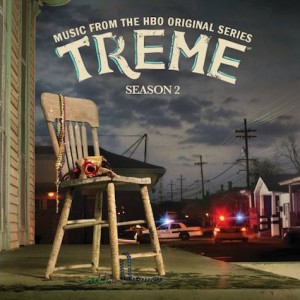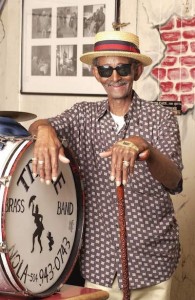Late jazz great Danny Barker was deeply committed to youth education and preserving New Orleans musical traditions.
With the advent of the first annual Danny Barker Guitar and Banjo Festival, Kenneth Ferdinand and Detroit Brooks, two of the festival’s principal organizers, discuss their concerns about the recent influx of transplants, ones that are too-quickly called “traditional New Orleans musicians.”
They explain why Barker’s ideals are of particular importance right now.
“We have a lot of great musicians from New Orleans, and there are lots that aren’t getting recognition because they aren’t being advertized,” said Kenneth Ferdinand.
“But you’ve got all sorts of people being billed as New Orleans musicians,” said Detroit Brooks. “For example, there’s an artist that’s getting famous around here right now. She’s been in this city two years, maybe three years. She’s good at what she does, but she’s not a New Orleans musician, and that’s what’s selling her. You can’t be here two years and say you play New Orleans music. And these kids you see playing on the street, now that may be good Appalachian stuff, but that’s not New Orleans music. To say it is, that’s an abuse.”
 According to Brooks, shows like Treme capitalize upon local life and music and add to its mischaracterization.
According to Brooks, shows like Treme capitalize upon local life and music and add to its mischaracterization.
“They’re living off of our culture. They’ve got Indians meeting in the street, and tapping fists,” Brooks said. “You’ve heard of Tootie Montana? I used to be a barber and I used to cut his hair, and he used to come in and cry because of the way that culture is being handled. How it’s being manipulated and turned commercial like everything else is. When someone comes in and puts a label on it, that’s when you sell out.”
That’s not to say that, with enough time, dedication, and humility, a newcomer can’t eventually meld into the local culture. According to Brooks and Ferdinand, some transplant musicians eventually develop a genuine New Orleans sound.
“The way to learn is to find the proper people to learn from,” Brooks said. “People will tell you, ‘this gumbo is the best gumbo in the world, at this place here’. You know what, the best gumbo in the world comes out of his house,” he said, jabbing his finger at Ferdinand. “Or my house. One of these houses. Some of the restaurants do a good gumbo, but the best one is when I go to my family’s to eat. You ain’t gonna beat that. And it’s the same with the best music, you have to sit down with somebody that knows the music. That lives it.”
Music in New Orleans is indeed inextricable from the city’s lifestyle.
“In the 6th Ward, 7th Ward, 9th Ward you see kids on the step banging on boxes, and they’ve got horns with no valves in them,” said Ferdinand. “But they’re playing traditional music, because they grew up in it. This is not something that people can pick up and learn out of a book. It’s life. It’s real life.”
That being said, many of the city’s young native musicians are straying from the traditional music to please crowds, or they aren’t learning the traditional forms in the first place.
“And a lot of these brass bands, they’re not playing real New Orleans music,” says Ferdinand. “They’re taking the style and the technique, but they’re playing pop songs on the corner because that’s what the young people want to hear. It’s commercial. They can sell those young groups quicker than they can Treme Brass Band or Dr. Michael White. These guys are playing, I don’t even know what they’re playing.
“Michael Jackson,” Brooks supplied.
“Yeah, Michael Jackson. And when they’re playing Michael Jackson, and dancing, and saying they’re second lining, something ain’t right,” Ferdinand said.
“And,” Brooks added, “they’re trying to sell it as traditional.”
Brooks, Ferdinand, and the other members of the festival committee want to initiate youth outreach programs and help educate the next generation in the traditions, just as Danny Barker did for their own generation.
“That’s our purpose, trying to attract the youth and make them realize why they’re playing that music,” Brooks said. “Trying to help them develop an understanding of what they’re doing so they can know where they’re going.”
This understanding is important economically as well as culturally.
“The young musicians need to know that they’re the future of this music, and we need to make it a business,” Ferdinand said. “And we need to have control of this empire we have.”
“It’s not just the music,” he continued. “it’s the economy. The only way you build an economy is to export the products and services, and you import the dollars. It’s critically important that the people of the world know what’s going on with our music, our jazz, so we can continue to build this local economy around that. What they have to get in their heads is the number one export item building the economy of New Orleans is the music. Without this music, this economy would collapse. It would be dead. That’s what we’re trying to get across. That this music is important. It’s more valuable to this city than most people think.”
Ferdinand can’t emphasize enough the importance of traditional music to the city’s livelihood.
“Without it, nobody would come to New Orleans,” he said. “You’d get a hotel room for what? To get assaulted? To get mugged? The only time people would come is Mardi Gras, I guess, to see the parades. But our industry has these hotels filled 365 days a year. So what do they come here for? Music. And maybe get a meal on the side. But number one, they come for the music, and it’s time we start fessin’ up and telling the truth. This New Orleans music is the not the sideline. It’s the whole point. It’s the pearl in the oyster. People don’t want to acknowledge it, they don’t want to say it, but it’s the truth. It’s the whole economy.”
With this in mind, Brooks, Ferdinand, and others are excited to plan future events that will, like the Danny Barker Festival, help educate and support the city’s young musicians. We’ll keep you posted on what’s to come.





